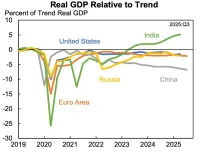Can India Lead a Global Movement for Planetary Stewardship?

Synopsis
Key Takeaways
- India can spearhead a global initiative for planetary stewardship.
- Judges play a crucial role in interpreting laws related to environmental and technological governance.
- The world faces interconnected crises that require a unified legal response.
- India's ambitious missions highlight its readiness for global environmental leadership.
- Updating legal frameworks is essential for addressing modern complexities.
New Delhi, Nov 22 (NationPress) Jitendra Singh, the Union Minister of State (Independent Charge) for Science & Technology, asserted on Saturday that India holds the potential to spearhead a global initiative for “planetary stewardship”. He called for a worldwide coalition to confront the urgent issues of climate change, environmental degradation, burgeoning technologies, and planetary governance.
Speaking at the panel discussion titled “Climate Justice and Planetary Stewardship: Legal frameworks for existential challenges” during the 26th International Conference of Chief Justices of the World in Lucknow, Dr. Singh highlighted the pivotal role of judges today, who find themselves at the intersection of constitutional interpretation, scientific understanding, and moral responsibility, thus shaping the future of humanity.
He pointed out that the globe is currently facing a series of “interconnected crises”—ranging from climate change and pandemics to cyber threats and ocean degradation—none of which acknowledge national borders. The minister emphasized that these global challenges necessitate legal responses grounded in equity, integrity, and intergenerational justice.
Dr. Singh noted that under the leadership of Prime Minister Narendra Modi, India has already established itself at the forefront of numerous future-oriented missions, including the Deep Ocean Mission and National Quantum Mission, alongside ambitious efforts in cybersecurity, biotechnology, AI, and space reforms.
He remarked that these initiatives exemplify India’s readiness to make significant contributions to global environmental governance and technological regulation.
Addressing emerging legal dilemmas such as privacy vs. surveillance, liberty vs. national security, and the challenge of AI-generated misinformation, Dr. Singh asserted that the judiciary will increasingly be tasked with interpreting laws in areas previously unimagined, including space debris, outer space mining, deep ocean resource exploitation, and the evolving field of cybersecurity and AI ethics.
Furthermore, he urged that both India and the international community must revise existing legal frameworks, especially in domains like space and oceans, where traditional laws fail to address modern complexities.
“Climate change, ocean degradation, and space debris will persist beyond our time—the repercussions will be felt by the youth present here and by future generations,” he emphasized.
The Minister advocated for incorporating fiduciary duties into constitutions, treaties, and court rulings to safeguard the rights of future generations and uphold planetary stewardship.









